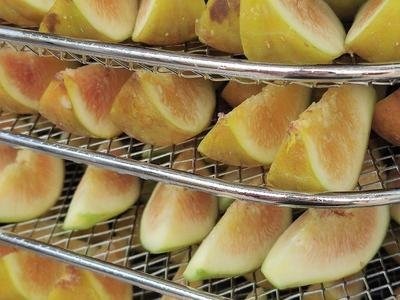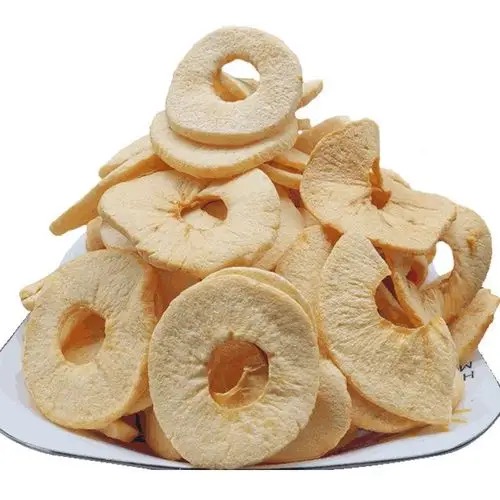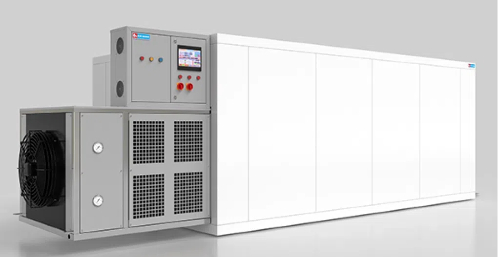
Content Menu
● Introduction
● Food Drying Process
>> Types of Food Drying Methods
● What is a Ventless Dryer Condenser?
>> Key Features of Ventless Dryer Condensers
● What is a Heat Pump Dryer?
>> Key Features of Heat Pump Dryers
● Ventless Dryer Condenser vs. Heat Pump: A Comparison
>> Energy Efficiency
>> Drying Temperature
>> Installation Flexibility
>> Cost Considerations
● Benefits of Using Food Dryers
● Choosing the Right Food Dryer for Your Business
● Maintenance Tips for Food Dryers
● Conclusion
● Frequently Asked Questions (FAQs)
>> 1. What is the main difference between a ventless dryer condenser and a heat pump dryer?
>> 2. Are heat pump dryers more expensive than ventless dryer condensers?
>> 3. Can I use either type of dryer for all types of food?
>> 4. How much space do I need for installation?
>> 5. Do these dryers require special maintenance?
Introduction
In the world of food preservation, drying is one of the most effective methods to extend shelf life while maintaining nutritional value. With advancements in technology, food dryers have evolved significantly. Among the most popular types are ventless dryer condensers and heat pump dryers. This article explores the features, benefits, and differences between these two types of food dryers, helping you make an informed decision for your business.

Food Drying Process
Food drying is a method that removes moisture from food products to inhibit the growth of bacteria, yeasts, and molds. This process can be done using various techniques, including sun drying, air drying, and mechanical drying using food dryers. The choice of method often depends on the type of food being dried and the desired quality of the final product.
Types of Food Drying Methods
1. Sun Drying: This is one of the oldest methods and involves placing food in direct sunlight. While it is cost-effective, it is highly dependent on weather conditions and can lead to inconsistent results.
2. Air Drying: Similar to sun drying but done in a controlled environment. This method is more reliable than sun drying but still takes a long time.
3. Mechanical Drying: This includes the use of dehydrators and dryers, which provide controlled temperature and airflow for consistent results.
What is a Ventless Dryer Condenser?
A ventless dryer condenser is a type of dryer that uses a closed-loop system to dry food products without the need for external ventilation. It works by drawing in air, heating it, and then passing it over the food items. The moisture from the food evaporates into the air, which is then condensed back into water and collected in a reservoir.
Key Features of Ventless Dryer Condensers
- Energy Efficiency: These dryers are designed to use less energy compared to traditional dryers. They typically operate at lower temperatures, which can save energy while still effectively removing moisture from foods.
- Compact Design: Ideal for small spaces, making them suitable for various commercial settings such as restaurants, cafes, and small-scale food production facilities.
- No External Venting Required: This feature allows for flexible installation options in areas where venting may be impractical or impossible.
- User-Friendly Operation: Many models come with digital controls that allow users to set specific drying times and temperatures easily.
What is a Heat Pump Dryer?
A heat pump dryer operates on a different principle. It uses a heat pump to transfer heat from the air inside the dryer to the food items. This method is highly efficient as it recycles hot air, reducing energy consumption significantly.
Key Features of Heat Pump Dryers
- High Energy Efficiency: Heat pump dryers can save up to 50% more energy than conventional drying methods due to their ability to recycle heat.
- Gentle Drying Process: They operate at lower temperatures (typically between 30°C to 70°C), which helps preserve the quality and flavor of the food while preventing nutrient loss.
- Environmentally Friendly: By using less energy and producing less waste heat, they are a more sustainable option compared to traditional dryers.
- Advanced Technology: Many heat pump dryers come equipped with sensors that monitor humidity levels, ensuring optimal drying conditions throughout the process.

Ventless Dryer Condenser vs. Heat Pump: A Comparison
When choosing between a ventless dryer condenser and a heat pump dryer for food drying, several factors come into play. Below is a comparative analysis based on various criteria:
| Feature | Ventless Dryer Condenser | Heat Pump Dryer |
| Energy Efficiency | Moderate | High |
| Drying Temperature | Higher | Lower |
| Installation Flexibility | High | Moderate |
| Cost | Generally Lower | Generally Higher |
| Drying Time | Faster | Slower |
Energy Efficiency
Energy efficiency is crucial for any commercial operation. Heat pump dryers excel in this area due to their ability to recycle hot air effectively, leading to significant reductions in energy consumption over time. Ventless dryer condensers are also efficient but may not match the performance of heat pump models when it comes to long-term savings.
Drying Temperature
Heat pump dryers operate at lower temperatures, which can be beneficial for delicate foods that require gentle drying methods such as herbs or fruits. In contrast, ventless dryer condensers may dry faster but at higher temperatures that could potentially affect food quality by altering flavors or causing nutrient degradation.
Installation Flexibility
Ventless dryer condensers offer greater flexibility in installation since they do not require external venting systems. This makes them ideal for locations with limited space or where ventilation is challenging. Heat pump dryers may require more planning during installation due to their need for adequate airflow around the unit.
Cost Considerations
While ventless dryer condensers typically have a lower initial purchase price, heat pump dryers can lead to significant savings on energy bills over time due to their efficiency. Businesses should consider both initial costs and long-term operational expenses when making their choice.
Benefits of Using Food Dryers
Using food dryers comes with numerous advantages:
- Extended Shelf Life: Dried foods can last much longer than fresh ones without refrigeration, making them ideal for storage and transportation.
- Nutritional Preservation: Proper drying methods can retain vitamins and minerals better than other preservation techniques like canning or freezing.
- Convenience: Dried foods are easy to store, transport, and prepare; they often require minimal preparation before consumption.
- Flavor Concentration: Drying can enhance the flavors of certain foods by concentrating their natural sugars and flavors as moisture evaporates.
- Reduced Waste: By drying surplus produce or leftovers, businesses can minimize waste while maximizing profit margins through value-added products.
Choosing the Right Food Dryer for Your Business
When selecting a food dryer, consider your specific needs:
1. Volume of Production: High-volume operations may benefit from heat pump dryers despite their higher cost due to lower energy consumption over time. Conversely, smaller operations might find ventless dryer condensers sufficient for their needs.
2. Type of Food: If you are primarily drying delicate items like herbs or fruits that require careful handling during processing, heat pump dryers may be preferable due to their gentle drying capabilities.
3. Space Constraints: If space is limited in your facility or kitchen area, opt for ventless dryer condensers that require no external venting; this allows for versatile placement options within your workspace.
4. Budget: Assess both initial costs (purchase price) as well as long-term energy savings when making your choice; sometimes investing more upfront leads to greater returns down the line through reduced utility bills.
5. Regulatory Compliance: Ensure that whichever type you choose meets any local health or safety regulations regarding food processing equipment; this could influence your decision based on compliance needs specific to your region or industry standards.
Maintenance Tips for Food Dryers
Regardless of whether you choose a ventless dryer condenser or a heat pump dryer, regular maintenance is essential for optimal performance:
- Clean Filters Regularly: Dust and debris can accumulate in filters over time; cleaning them regularly helps maintain airflow efficiency.
- Inspect Seals and Gaskets: Ensure that all seals are intact; damaged seals can lead to inefficiencies by allowing hot air escape during operation.
- Check Water Reservoirs (for Condensate Models): For ventless models that collect moisture in reservoirs, empty them regularly to prevent overflow issues during use.
- Schedule Professional Servicing: Consider having your equipment serviced by professionals annually; this ensures all components function correctly while extending lifespan through preventative care measures.
Conclusion
Choosing between a ventless dryer condenser and a heat pump dryer ultimately depends on your specific needs and circumstances within your business operations related to food processing or preservation activities. While both types offer unique advantages tailored towards different applications—understanding their differences can help you make an informed decision that aligns with your overall goals regarding productivity levels while ensuring high-quality dried products meet customer expectations consistently over time!
Investing in the right technology not only enhances productivity but also ensures high-quality dried products that meet customer expectations while promoting sustainability through energy-efficient practices beneficial both economically environmentally conscious decisions alike!

Frequently Asked Questions (FAQs)
1. What is the main difference between a ventless dryer condenser and a heat pump dryer?
The main difference lies in their operation; ventless dryer condensers use higher temperatures and do not recycle air as effectively as heat pump dryers, which operate at lower temperatures and recycle hot air for greater efficiency.
2. Are heat pump dryers more expensive than ventless dryer condensers?
Yes, heat pump dryers generally have a higher initial purchase price but can lead to significant energy savings over time due to their efficiency in operation compared with traditional methods like vented systems or even some condenser models available today!
3. Can I use either type of dryer for all types of food?
While both types can dry various foods effectively when used correctly according specific guidelines provided by manufacturers—heat pump dryers tend be better suited especially delicate items requiring careful handling during processing due gentler approach employed throughout entire cycle preserving quality integrity final product achieved!
4. How much space do I need for installation?
Ventless dryer condensers require less space since they do not need external ventilation; however ensure there's adequate room around any type unit installed allow proper airflow maintain optimal performance levels throughout usage periods!
5. Do these dryers require special maintenance?
Both types require regular maintenance; however heat pump dryers may need more attention due complex systems involving refrigerants—keeping everything clean functional will ensure longevity reliability operations performed efficiently without issue arising unexpectedly!












